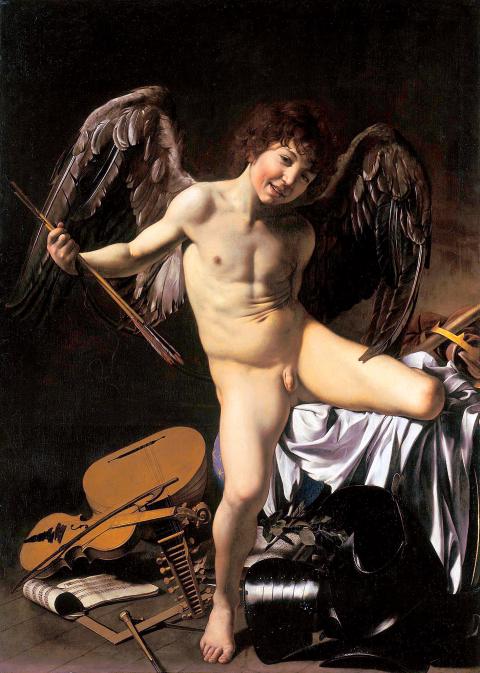Chinese Practice
有錢能使鬼推磨
(you3 qian2 neng2 shi2 gui3 tui1 mo4)

Photo: Wikimedia Commons
照片:維基共享資源
money will make the Devil turn millstones
「Galle, quid insanis?」
「伽魯斯,你瘋了嗎?」太陽神阿波羅對垂死的、犯相思病的伽魯斯問道。
伽魯斯是古羅馬詩人維吉爾《牧歌集》的第十首也是最後一首詩中的角色,《牧歌集》出版於西元前三十七年。阿波羅想要給心碎的伽魯斯加油打氣,但他仍是傷心欲絕。伽魯斯的情人呂柯梨絲拋棄了他,投向另一個男人的懷抱。伽魯斯回答阿波羅說,是的,我瘋了,為愛而瘋狂,因為「Omnia vincit amor; et nos cedamus amori」(愛勝過一切;所以讓我們臣服於愛)。
詩中的角色呂柯梨絲是本於一位歷史人物,即名為敘賽梨絲的名伶。她一定是位不凡的女性,因為她的情人先後包括布魯特斯(西元前八十五年~前四十二年,布魯特斯曾共謀刺殺凱撒;傳說凱撒被刺後臨死之前問的「布魯特斯,你也有份嗎?」這句名言,指的便是他),以及安東尼(西元前八十三~前三十年,他是埃及豔后克麗奧佩特拉(西元前六十九~前三十年)的最後一位情人)。或許我們不應苛責伽魯斯為愛瘋狂。
在拉丁文中,「amor」意為「愛」,「omnia」為「全部」,「vincit」是動詞「征服」。「omnia vincit amor」這句話的意思,或許有人認為是按照詞序翻譯為「一切征服愛」。但拉丁文法中的詞序是可變動的,其詞格為「變格」,表示它在句子中的功能,因此它真正的意思是「愛征服一切」。維吉爾之所以選擇「omnia vincit amor」這樣的順序,是位了要符合六音步詩的格律──這行詩必須以長母音開頭(因此omnia一字適用),而不能用短母音(amor一字即為短母音開頭)。義大利畫家卡拉瓦喬(一五七一~一六一○)把他一六○二年的畫作命名為「Amor Vincit Omnia」,使這句話符合慣用的「主詞─動詞─受詞」語序,因為畫作之名不需受詩的格律拘束。卡拉瓦喬版的這句拉丁文跟今日常用的英文說法「Love conquers all」(愛征服所有人)較為相像。
美國女演員、歌手、喜劇演員及性感偶像梅‧蕙絲(一八九三~一九八○),曾打趣地說「Love conquers all things except poverty and toothache」(愛情征服一切,除了貧窮和牙痛之外)。除此之外,很少有人否認愛情是一種強大的力量。「It’s love that makes the world go round」(讓世界轉動的是愛情)這句話的原創者,常被認為是英國詩人及劇作家威廉‧施文克‧吉伯特爵士(一八三六~一九一一),他以喜劇《吉伯特與沙利文》成名。但這概念或許不是吉伯特自己想出來的,因為在此之前,即有一首法文香頌廣為流傳(作者不詳),其歌詞如下:
C’est l’amour, l’amour, l’amour, (是愛,愛,愛)
Que fait le monde a la ronde. (讓世界轉動)
Et chaque jour, a son tour, (日復一日,它旋轉時)
Le monde fait l’amour. (世界變出愛)
然而,「愛」自有其敵人──金錢。改編自歌舞劇的一九七二年電影《酒店》,把這句話加以改造,成為片中歌曲的曲名「Money Make the World Go Round」(金錢讓世界轉動),而廣為流傳。
瘋狂、無能為力的神、心碎、政治謀殺、征服、高雅藝術、牙痛和金錢,這些我們以上都談到了。
明代沈璟(西元一五五三~一六一○年)作於一五九九年的戲劇《義俠記》中,有這句話:「有錢能使鬼推磨,一分錢鈔一分貨」──我們現今所說的「有錢能使鬼推磨」和「一分錢一分貨」便是由此而來。「有錢能使鬼推磨」所表達的意思,亦即上述的「money makes the world go round」,或是「money talks」(金錢會說話),這也讓我們再次見識到金錢壓倒一切的力量。
(台北時報林俐凱譯)
不要再說了,雖然有錢能使鬼推磨,但你還是收買不了我。
(Back off. I know money makes the world go around, but you can’t bribe me.)
這工作危險性非常高,所以老闆把待遇提高,結果還是有很多人來應徵,讓我們見識到什麼叫做「有錢能使鬼推磨」。
(This job is actually extremely dangerous, but the boss is willing to pay extra, and so a lot of people have signed up for it. This is what they mean when they say “money talks.”)
英文練習
Love conquers all; love/money makes the world go round
“Galle, quid insanis?”
So said the god Apollo to the dying, love-sick Gallus. “Are you mad, Gallus?”
Gallus was a character in the 10th and final poem of the Bucolica, also known as the Eclogues, published in 37 BC. Apollo was trying to cheer the heart-broken man up, but Gallus was inconsolable. His lover, Lycoris, had left him for another man. His answer to the god was, yes: I am mad. Mad with love; for “Omnia vincit amor; et nos cedamus amori” (Love conquers all; let us, too, yield to love).
Lycoris was based on a historical character, a famous actress named Cytheris. She must have been quite a woman: she had, at different times in her life, taken both Marcus Junius Brutus the Younger (85 BC – 42 BC), who was involved in the assassination of Julius Caesar (Et tu, Brute?) and Marcus Antonius (83 – 30 BC), known in English as Mark Antony, who was Egyptian ruler Cleopatra’s (69 – 30 BC) final lover. Perhaps we cannot blame Gallus for being driven insane by love.
The Latin for “love” is amor; omnia means “all”; vincit is the verb “to conquer.” In terms of word order, then, one might think that omnia vincit amor should be translated as “Everything conquers love.” In Latin grammar, however, word order is flexible, as a word’s case denotes its function within the sentence. Virgil chose that order to conform with the dictates of poetic hexameter: the line had to begin with a long vowel (“omnia”), not a short one (“amor”). The Italian painter Caravaggio (1571– 18 July), unconstrained by the dictates of hexameter, altered the phrase to the more conventional word order of subject-verb-object when he titled his 1602 painting Amor Vincit Omnia. This is more recognizable as the Latin for the English phrase commonly used today: “Love conquers all.”
With the exception, perhaps, of late US actress, singer, comedian and sex symbol Mary Jane “Mae” West (1893 – 1980) — who once quipped “Love conquers all things except poverty and toothache” — few would argue that love is a powerful force. The English poet and dramatist Sir William Schwenck Gilbert (1836 – 1911) — of Gilbert and Sullivan fame — is often credited with coining the phrase “It’s love that makes the world go round.” He probably didn’t come up with the idea, though: it appears in a popular — anonymous — French chanson that goes:
C’est l’amour, l’amour, l’amour, (It’s love, love, love)
Que fait le monde a la ronde. (That makes the world go round)
Et chaque jour, a son tour, (And every day, as it turns)
Le monde fait l’amour. (The world makes love)
And yet, love has its own rival: money. The 1972 movie of the musical Cabaret popularized a different take on the phrase, with the song “Money Makes the World Go Round.”
And there were have it: madness, impotent deities, heartbreak, political assassination, conquest, high art, toothache and money.
The 1599 Ming Dynasty drama yixia ji (The Noble Knight-errant) by Shen Jing (1553–1610) has the phrase 有錢能使鬼推磨,一分錢鈔一分貨, from which we get two sayings still in use today: 有錢能使鬼推磨 (money will make the Devil turn millstones), an alternative for “money makes the world go round” or “money talks”; and 一分錢一分貨 (you get what you pay for). Again, 有錢能使鬼推磨 speaks of the overriding power of cash.
(Paul Cooper, Taipei Times)
It is said that love conquers all, but money is really tight, and this is putting a real strain on our relationship.
(人都說愛情征服一切,但我們太窮了,這讓我倆的感情很難維繫。)
They say that love makes the world go round, but I always thought the Earth spins due to particle momentum that began during the collapse of the proto-Solar System.
(人都說愛情讓世界旋轉,但我一直認為地球之所以旋轉,是由原始太陽系坍縮期間所形成的粒子動量所造成。)

For many people in Taiwan, childhood memories of rural life include pig pens standing beside family homes. Leftover rice, vegetable scraps and soup from daily meals were poured into buckets and fed to pigs. This practice of feeding pigs with household food waste was once a common way of life, both an economic choice and an expression of agricultural society’s deep respect for conserving resources. From a practical standpoint, pigs are omnivorous animals capable of efficiently digesting food scraps that humans can no longer eat. For rural households, food waste cost almost nothing, yet it could be converted into pork, a

Tango unfolds in a dimly lit room, where a haunting melody ushers two dancers into a close embrace. Here, music and movement merge into a silent yet passionate conversation, expressing longing, memory and shared purpose. What makes tango truly magical is the deep interaction and spontaneous improvisation between partners. Tango began in the late 19th century in Buenos Aires, Argentina’s bustling capital. Born in the poor working-class neighborhoods and busy port areas, this dance emerged from a melting pot of cultures. European immigrants, African slaves and local residents all contributed to its unique character. From these rich influences, tango

A: What show are you watching online? B: I’m watching “Fly Me to the Moon & Back” – an exhibition launched by the Taipei Music Center (TMC) to commemorate the late singer Tom Chang. A: Known for his sky-high notes, Chang is praised as one of the best singers in the 1990s. His death at the age of 31 was a major loss indeed. B: And I’m so glad that we went to the TMC’s 90s-themed concert last Friday. I finally saw the iconic “Godmother of Rock” WaWa perform live. A: This year-end show also featured singers Princess Ai, Bii, Wayne Huang, PoLin and

A: Apart from the Taipei Music Center’s exhibit and concert, US pop rock band OneRepublic and rapper Doja Cat are touring Kaohsiung this weekend. B: OneRepublic is so popular that after tonight’s show at the K-Arena, they are set to return to Taiwan again in March next year. A: And Doja will also perform at the same venue on Sunday, right? B: Yup. Her collab with Blackpink’s Lisa and singer Raye for the song “Born Again” has been a huge worldwide success. A: Doja even made it on Time magazine’s “100 Most Influential People” list in 2023. She’s so cool. A: 本週末除了北流的特展和演唱會外,美國男團共和世代和饒舌歌手蜜桃貓朵佳也將來台開唱。 B: 共和世代因太受歡迎,繼今晚高雄巨蛋的演唱會後,預計明年3月即將再度來台巡演唷。 A: 朵佳本週日將在同場地開唱,對不對?